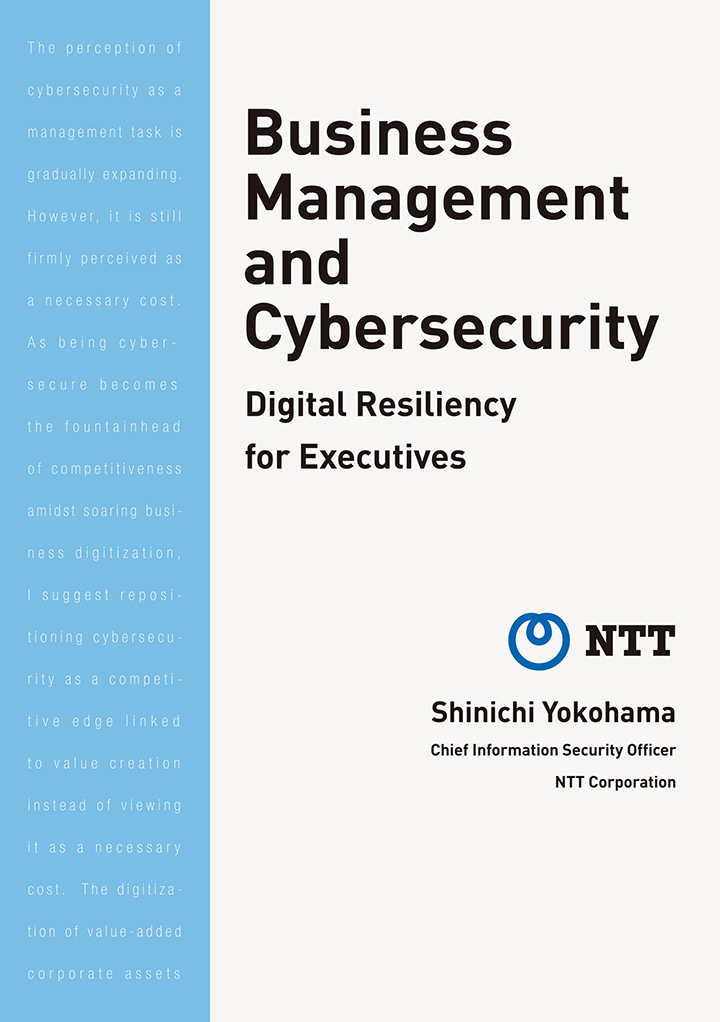
サイバーセキュリティ管理の成功は、デジタル経済におけるビジネス競争力を確実にアップします。
Business Management and Cybersecurity Digital Resiliency for Executives
¥--- (税込)
Shinichi Yokohama Chief Information Security Officer NTT Corporation
A5判・176頁(ソフトカバー)
ISBN 978-4-86522-163-3
2018年9月発行
![]()
The perception of cybersecurity as a management task is gradually expanding. However, it is still firmly perceived as a necessary cost. As being cyber-secure becomes the fountainhead of competitiveness amidst soaring business digitization, I suggest repositioning cybersecurity as a competitive edge linked to value creation instead of viewing it as a necessary cost.
--Shinichi Yokohama, NTT Corporation
Business Management and Cybersecurity
The digitization of valued-added corporate assets such as intellectual property and brands elevate digitization of corporate risk. Maintaining cybersecurity means management of digitized corporate risk, and is inseparable from business strategy. The success or failure of cybersecurity management will differentiate business competitiveness within the digital economy.
Cybersecurity is a Business Management Issue
Today the focus is overwhelmingly on data breaches, but those are not the only management risks. Cybersecurity is a management issue primarily because:
?Business continuity may be threatened
?Cybersecurity protects stakeholder trust
?Underpinning digital innovation spurs corporate growth.
Imperative Actions for Business Executives
There are three imperative actions which business executives should take:
1.Prioritize objectives for protection and create layered defense accordingly
2.Ensure early detection, response and recovery as 100% safeguarding is impossible
3.Review all preparations periodically at board and executive management meetings.
Collaboration with Other Companies
Companies can mitigate their workforce and resource deficiencies through mutual collaboration in information sharing and workforce development. As intra-industry firms have similar concerns, and greatly shared needs in terms of workforce and information, collaborating within an industry represents a practical first step. Sector-based Information Sharing and Analysis Centers (ISACs) have arisen within industries.
Global Management
Dealing with cybersecurity from a global standpoint is necessary not only for multinational companies, but for industry as a whole. Global security governance of one’s own company is essential. Moreover, it is important to strengthen the supply chain and contribute to international policy harmonization.
Collaboration with Government
Industry should not passively await government policy; rather, it must engage in proactive outreach and advocacy to ensure that its needs are met by government. Action is beginning in the capacity building sphere and should be augmented by information sharing and other means. Cybersecurity is a public good. It is essential that industry plays a proactive role in its establishment and maintenance.
著者紹介
Shinichi Yokohama leads cybersecurity activities for the entire NTT Group. He has been active in public advocacy in Japan, the United States and recently in ASEAN and Europe. He was on a panel at the White House Cyber Security Summit in February 2015, National Institute of Standards and Technology (NIST), Department of Commerce, Cybersecurity Framework workshop in April 2016 and May 2017, and the G7 ICT Industry Ministerial Multi-stakeholder Conference in Torino, Italy in September 2017. In October 2015, his team published a Japanese book, “Cybersecurity for Business Executives” to share his insight on cybersecurity challenges from business management perspective and lead industry collaboration that aligns with international norms and practices (English translation available on http://www.ntt.co.jp/topics_e/CfBE/).
Before starting a security role in July 2014, he was with NTT DATA and led its post-acquisition integration of non-Japan operations. Prior to joining NTT, he was with McKinsey Japan for 18 years focusing on telecom and high-tech industries, and led its Technology Practice. He started his career at the Ministry of International Trade and Industry (currently, the Ministry of Economy, Trade and Industry) of Japanese government, where he crafted industrial technology policy for 8 years.
Shinichi holds a Bachelor of Engineering in nuclear engineering from the University of Tokyo. He also has a Master’s degree in Public Policy from the Kennedy School of Harvard.
As his social contribution, he is a board member of Special Olympics Japan.

